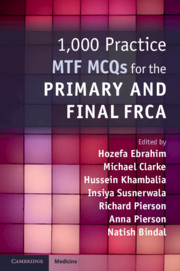
Learn more about the resources that will aid in assessment preparation for anaesthesia trainees. Specific PEx, FEx and PCIA-related resources can be accessed via the dedicated drop-downs. Further detail on assessments may be found in the ANZCA Anaesthesia Training Program Curriculum and ANZCA Anaesthesia Training Program Handbook.
Guide index
 Library > Library guides > Training & examinations > Anaesthesia training resources
Library > Library guides > Training & examinations > Anaesthesia training resources
How to access e-books
 Use your ANZCA college ID (or staff username) and password to access library e-resources.
Use your ANZCA college ID (or staff username) and password to access library e-resources.
 Having trouble logging into e-resources? Try emptying your browser cache, closing and reopening your browser and trying again.
Having trouble logging into e-resources? Try emptying your browser cache, closing and reopening your browser and trying again.
 Forgotten your ANZCA password? Try resetting your password using the "Forgot Password?" link and/or messaging the "Technical support" via the college contact form
Forgotten your ANZCA password? Try resetting your password using the "Forgot Password?" link and/or messaging the "Technical support" via the college contact form
 Can't find your book online? Borrow a print copy or request a chapter via our article request service
Can't find your book online? Borrow a print copy or request a chapter via our article request service
 Experiencing difficulties, or need help accessing e-books? Contact the Library
Experiencing difficulties, or need help accessing e-books? Contact the Library
 For further information about searching and accessing e-books, see the E-books guide
For further information about searching and accessing e-books, see the E-books guide
Borrowing books
 ANZCA library provides access to a large range of print items, specialising in anaesthesia and pain medicine-related titles.
ANZCA library provides access to a large range of print items, specialising in anaesthesia and pain medicine-related titles.
 For further information about requesting books, see the Borrowing books page
For further information about requesting books, see the Borrowing books page
A note on exam texts
 Several acronyms are used repeatedly by the texts listed in this guide. What follows is a summary of the key acronyms.
Several acronyms are used repeatedly by the texts listed in this guide. What follows is a summary of the key acronyms.
A selection of resources are listed below.
 A note on the listed FRCA content: The ANZCA Final Exam is sat at a later point than the FRCA Final Exam, so some of the suggested responses in the content listed below may not fully reflect the knowledge and experience expected from an ANZCA Final Exam participant. As a result, these resources should be used with caution.
A note on the listed FRCA content: The ANZCA Final Exam is sat at a later point than the FRCA Final Exam, so some of the suggested responses in the content listed below may not fully reflect the knowledge and experience expected from an ANZCA Final Exam participant. As a result, these resources should be used with caution.
 A large number of additional texts can be accessed via the Exam preparation guide. For resources related to the Patient Clinical Interaction Assessment (PCIA) - see dedicated page [coming soon].
A large number of additional texts can be accessed via the Exam preparation guide. For resources related to the Patient Clinical Interaction Assessment (PCIA) - see dedicated page [coming soon].
 1,000 Practice MTF MCQs for the Primary and Final FRCA
by
Written for anaesthesia trainees, this comprehensive text covers all the MCQ preparation required for both the Primary and Final FRCA exams. Broken down into five sections, there are 150 questions for each of the physics, pharmacology, anatomy, and physiology sections, and a fifth section of 400 questions covering clinical anaesthesia. The first four sections of 150 questions match the Primary exam and are laid out to follow its format. The fifth clinical section covers the entire clinical syllabus. The authors are educators in anaesthesia and surgery and their wealth of experience has been brought together in this text to benefit the next generation of anaesthetists. Covering the entire syllabus, with 1,000 expertly distributed questions, this is the most comprehensive text available for MCQ preparation for both parts of the FRCA.
1,000 Practice MTF MCQs for the Primary and Final FRCA
by
Written for anaesthesia trainees, this comprehensive text covers all the MCQ preparation required for both the Primary and Final FRCA exams. Broken down into five sections, there are 150 questions for each of the physics, pharmacology, anatomy, and physiology sections, and a fifth section of 400 questions covering clinical anaesthesia. The first four sections of 150 questions match the Primary exam and are laid out to follow its format. The fifth clinical section covers the entire clinical syllabus. The authors are educators in anaesthesia and surgery and their wealth of experience has been brought together in this text to benefit the next generation of anaesthetists. Covering the entire syllabus, with 1,000 expertly distributed questions, this is the most comprehensive text available for MCQ preparation for both parts of the FRCA.
 Anatomy for the FRCA
by
Anatomy questions are asked in all parts of the FRCA examinations, and for many trainees it is a particularly daunting part of the exams. This important new book provides a comprehensive, exam-orientated clinical anatomy book for anaesthetists preparing for all parts of the FRCA. It covers all body regions, relating underlying anatomy to practical procedures and anatomical principles, spanning the breadth of the curriculum and comprising exam-style questions: a chapter of SAQ questions, one of OSCE stations, one of SOE questions and one of MCQs. The text is highly illustrated in full colour with ultrasound images, diagrams and photographs of cadaveric material and models.
Anatomy for the FRCA
by
Anatomy questions are asked in all parts of the FRCA examinations, and for many trainees it is a particularly daunting part of the exams. This important new book provides a comprehensive, exam-orientated clinical anatomy book for anaesthetists preparing for all parts of the FRCA. It covers all body regions, relating underlying anatomy to practical procedures and anatomical principles, spanning the breadth of the curriculum and comprising exam-style questions: a chapter of SAQ questions, one of OSCE stations, one of SOE questions and one of MCQs. The text is highly illustrated in full colour with ultrasound images, diagrams and photographs of cadaveric material and models.
 The Final FRCA Constructed Response Questions: A Practical Study Guide
by
The only book to offer clear guidance on HOW TO APPROACH the questions in this exam Covers past questions, which reguarly recur in the Final FRCA exam - thus saves candidates enormous amounts of work going back through past papers. The author has a 'helicopter view' of what to include in the answers, brought by years of teaching, experience and knowledge of what the College is looking for. The presentation of the information is exactly as it should be presented for the exam. The candidate will thus learn to understand by example how they can score marks in the exam and avoid wasting time on lengthy prose. Carefully referenced and well researched.
The Final FRCA Constructed Response Questions: A Practical Study Guide
by
The only book to offer clear guidance on HOW TO APPROACH the questions in this exam Covers past questions, which reguarly recur in the Final FRCA exam - thus saves candidates enormous amounts of work going back through past papers. The author has a 'helicopter view' of what to include in the answers, brought by years of teaching, experience and knowledge of what the College is looking for. The presentation of the information is exactly as it should be presented for the exam. The candidate will thus learn to understand by example how they can score marks in the exam and avoid wasting time on lengthy prose. Carefully referenced and well researched.
 Interactive Cases for the Oral Boards
by
Learn essential principles of anesthesiology through an interactive environment that guides you through information gathering, synthesis, decision making, and reevaluation in order to arrive upon the best anesthetic plan.
Build a case from color-coded cards that guide you through various clinical conditions, surgical procedures, and events or crises that can occur during your patient encounter. Cases can be selected from discrete topics or built at random to test your knowledge. Progress within a case is tracked so you can start and stop at any time, or retake them at your convenience to practice difficult concepts.
Interactive Cases for the Oral Boards
by
Learn essential principles of anesthesiology through an interactive environment that guides you through information gathering, synthesis, decision making, and reevaluation in order to arrive upon the best anesthetic plan.
Build a case from color-coded cards that guide you through various clinical conditions, surgical procedures, and events or crises that can occur during your patient encounter. Cases can be selected from discrete topics or built at random to test your knowledge. Progress within a case is tracked so you can start and stop at any time, or retake them at your convenience to practice difficult concepts.
Related guides and exam preparation resources.



*Please Note: The user must create a free local profile to access this feature.
Access resources related to particular topic areas.
Anatomy
Acute trauma management


Biochemistry
Interpretations of ECGs
Management of the morbidly obese
Paediatric anaesthesia

Perioperative medicine

Learn@ANZCA (formerly Networks) is the college's learning management system.
 Note: Some resources located in Learn@ANZCA require that you first register before accessing.
Note: Some resources located in Learn@ANZCA require that you first register before accessing.


These videos explore how vivas are scored to provide a clear understanding of the evaluation criteria. The written commentary highlights examiner techniques and assessment of the candidates’ performance.
Please Note: These are simulated vivas created for demonstration and educational purposes only, and do not represent the professional practice of those involved in the simulations. It is also important to note that viva exams are usually conducted with two examiners, not one as depicted in the videos.
Candidate A: 2-5
Candidate B: 3-5
Candidate C: 5-5
A number of preparatory courses are available via ANZCA, the ASA and other providers.




The following websites are not endorsed by ANZCA, and may contain factual errors. Non-peer-reviewed medical education resources should be used with caution.




The following podcasts are highly recommended for those studying for the final exam.



The following webinars are recommended for those studying for the final exam.
Title: ABCs of Anaesthesia: How to pass the Final ANZCA Anaesthesia Exam
Tips from my lecture at the college of anaesthetists.

Quick links
About ANZCA
Copyright © Australian and New Zealand College of Anaesthetists.